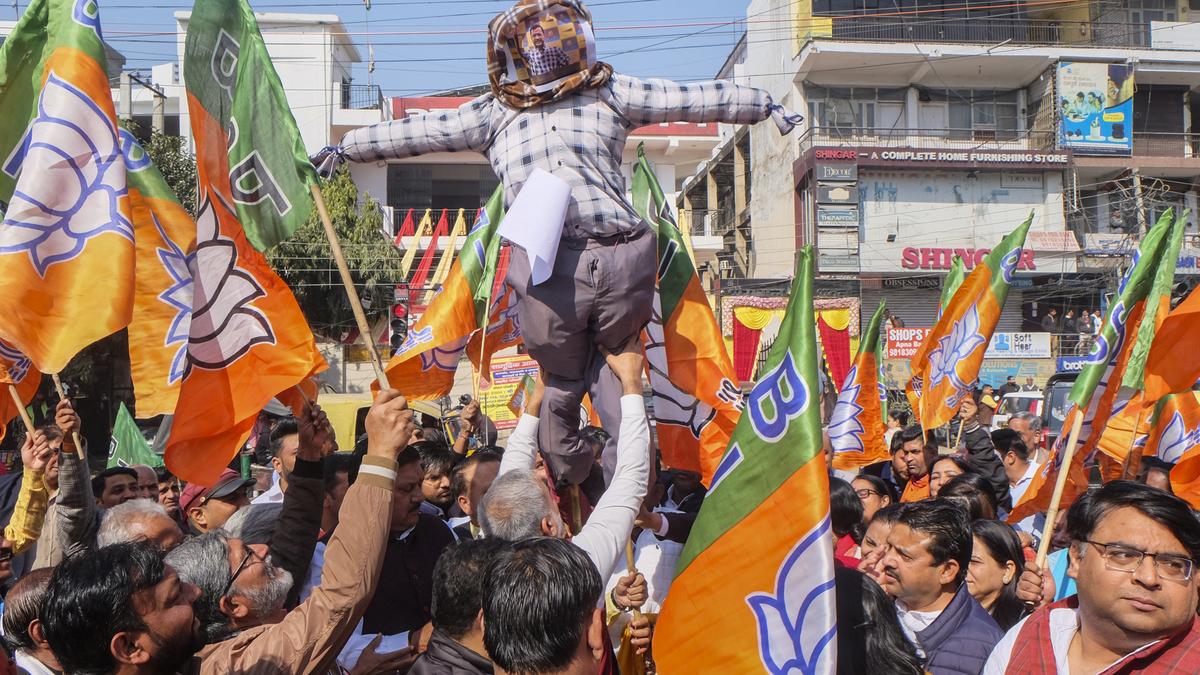 |
|
The political landscape of India witnessed a heated exchange between the Bharatiya Janata Party (BJP) and the Aam Aadmi Party (AAP) centered around allegations of Yamuna river pollution. The conflict erupted after AAP chief Arvind Kejriwal accused the BJP, the ruling party in Haryana, of deliberately contaminating the Yamuna River with industrial waste. Kejriwal's assertion, made on January 27th, 2025, painted a grim picture, alleging that the BJP was essentially poisoning the river and endangering the lives of those who consumed its water. This inflammatory statement ignited a firestorm of protest from the Haryana BJP.
The BJP’s response was swift and forceful. On January 28th, 2025, the Haryana BJP organized widespread protests across the state, including in Karnal, Sonipat, and Panchkula. These demonstrations involved burning effigies of Kejriwal, a symbolic act of protest reflecting the intensity of the BJP's outrage. Several prominent BJP leaders, including state ministers Ranbir Gangwa, Vipul Goel, and Anil Vij, participated actively in these protests. Their speeches echoed a unified message: Kejriwal's accusations were baseless, politically motivated, and an attempt to deflect attention from his own failings in Delhi.
Haryana Chief Minister Nayab Singh Saini also vehemently rejected Kejriwal's claims, accusing the Delhi Chief Minister of habitually making unfounded allegations. Saini's statement included a warning: Kejriwal should issue an immediate apology or face a defamation lawsuit. The BJP's arguments centered on several key points. They asserted that Haryana provides Delhi with its fair share of Yamuna water, and even more. They further argued that Kejriwal's accusations were a desperate attempt to distract from the AAP's impending defeat in the upcoming Delhi Assembly elections. The BJP used social media platforms, such as X (formerly Twitter), to disseminate their message, highlighting what they perceive as the AAP's broken promises to the people of Delhi and the deterioration of the Yamuna's condition under their rule.
The BJP’s rhetoric escalated with accusations of Kejriwal's ‘poisoning’ not only of the Yamuna but also the air of Delhi. They characterized Kejriwal’s claims as lies, branding him as 'Farziwal' (a play on his name implying falsehood). The BJP’s online posts further attacked Kejriwal for directing blame towards Haryana, his birthplace, emphasizing the perceived shamelessness of his actions. The accusations exchanged between the two parties were not limited to environmental concerns. Delhi Chief Minister Atishi had also accused the BJP of deliberately disrupting Delhi’s water supply as a political maneuver, alleging the BJP was attempting to create water shortages to influence voters in the upcoming Delhi elections. The exchange between the two parties highlights the deep political divide and escalating tensions leading up to the crucial Delhi elections.
The accusations and counter-accusations surrounding the Yamuna River pollution highlight the intense political rivalry between the BJP and AAP. The conflict extends beyond a simple environmental dispute; it is a manifestation of a wider struggle for political dominance in Delhi and Haryana. The use of strong language and personal attacks underscore the high stakes involved and the desperation of both parties to secure favorable public opinion before the upcoming elections. The incident also underscores the challenges in addressing environmental issues when they become intertwined with political maneuvering and point to the need for a more collaborative and evidence-based approach to resolving environmental problems, rather than employing them as political weapons.
The conflict also raises questions about the transparency and accountability of both state governments in managing their respective contributions to the Yamuna’s health. Independent investigations and environmental assessments are crucial to verifying the claims of both sides. The outcome of the Delhi elections will likely further shape the political narrative surrounding this conflict and determine the future trajectory of the environmental discourse surrounding the Yamuna River. The incident serves as a stark reminder of how crucial it is to maintain a focus on environmental protection, separating environmental concerns from political point-scoring and ensuring that political debates are based on factual evidence rather than inflammatory rhetoric. The long-term health of the Yamuna River and the well-being of the people who depend on it remain at stake, demanding a collaborative and evidence-based approach that prioritizes environmental protection over political gain.
Source: BJP holds protests in Haryana over Kejriwal's 'poison in Yamuna' remark
